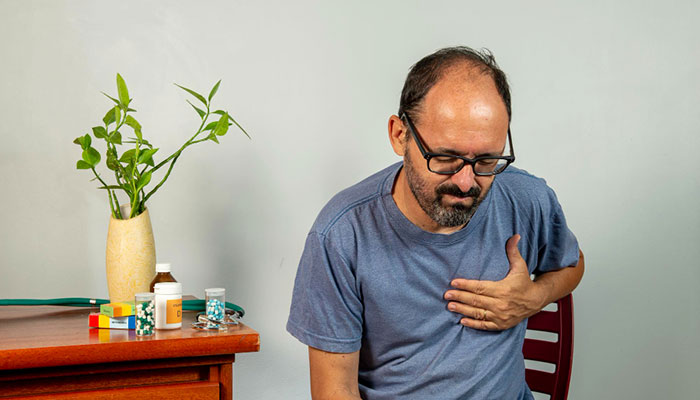Introduction
Peptic ulcers occur due to the erosion of the mucous lining in the stomach or duodenum, which allows gastric acid and digestive enzymes to seep and erode the inner lining of the stomach and duodenum.
Common types of peptic ulcers include:
Gastric ulcer: It occurs within the lining of the stomach.
Duodenal ulcer: It occurs in the upper portion of the small intestine, known as the duodenum.
Signs and Symptoms of Peptic Ulcers
- Nausea
- Heartburn
- Burning stomach pain
- Appetite changes
- Dark stools
- Feeling of fullness, bloating, or belching
- Intolerance to fatty foods
Causes of Peptic Ulcers
Peptic ulcers are caused by several factors, but the most common are:
- Helicobacter pylori (H. pylori) infection
- Long-term use of NSAID medications
- Stress and spicy foods don’t cause a peptic ulcer, but they can worsen symptoms
Understanding Peptic Ulcers in Ayurveda
Ayurveda states that gastric ulcers are caused by an imbalance in the body’s processes or three doshas: “Vata”, “Pitta” and “Kapha”. Disruption of the metabolic process, or Pitta, plays a major role in the formation of peptic ulcers.
Treatment and Management
Treatment aims to reduce inflammation, induce remission, and prevent relapses. Medications (proton pump inhibitors, H2 blockers), lifestyle changes, and nutritional support help in bringing relief in this condition.
Palliative Care provided by SGP’s PSA can also be an integral part of managing peptic ulcers, particularly for individuals with advanced disease or persistent symptoms. Palliative Care provided by SGP’s PSA aims to enhance quality of life by addressing pain management, symptom control, emotional support, and psycho-social well-being.
FAQs about Peptic Ulcers
-
Peptic ulcers are often associated with stress, but stress is not the only factor that causes peptic ulcers. Stress can have a detrimental effect on the body’s ability to heal itself, which makes ulcers more likely to develop in the abdomen.
-
If you have peptic ulcer disorder, try to eat a diet that is high in fibre and rich in vegetables, fruits, and whole grains. Aim for a daily intake of at least 7 servings of vegetables and fruits and 5 servings of whole grains.
-
The healing of peptic ulcers depends on the severity and number of lesions. If the diagnosis and treatment are made at the appropriate time, the lesions typically resolve within 4 to 6 weeks. However, they are susceptible to recurrence if the underlying cause is not diagnosed and treated.
-
If peptic ulcers are left untreated, they can cause internal bleeding. This can be either slow and gradual, resulting in anaemia, or more severe, resulting in hospitalization or blood transfusions. In cases of severe bleeding, black or blood-stained vomit or stools may be present. So, it is advised to seek medical attention as soon as possible.
-
To prevent the development of peptic ulcers, it is recommended to limit the consumption of alcoholic beverages to two per day, avoid taking alcohol with medication, wash hands frequently to prevent infections, and limit the use of anti-inflammatory medications such as ibuprofen and naproxen.






